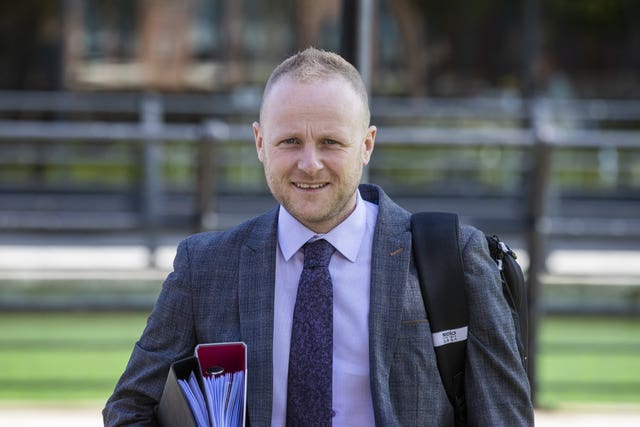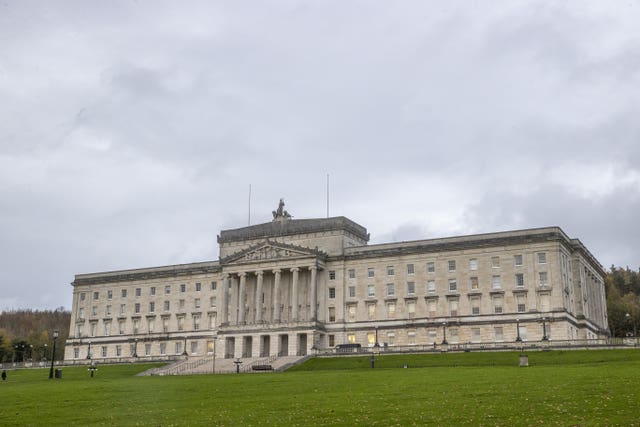DUP leader Sir Jeffrey Donaldson has insisted he will not bow to “pressure, threats or blackmail” in response to a letter which said that his party’s return to Stormont could lead to mass loyalist street protests.
Sir Jeffrey said “anyone who thinks that they can exert influence on policy or intimidate our party by making such threats is sadly mistaken”.
It follows a letter sent by loyalist activist Jamie Bryson to unionist leaders on behalf of Unionist Voice Policy Studies (UVPS).
In the letter, Mr Bryson argues against the DUP returning to Stormont following the implementation of key elements of the Windsor Framework.

The DUP has been blocking powersharing for more than a year in protest at the internal UK trade barriers created by Brexit’s Northern Ireland Protocol.
The party says the framework deal struck by the EU and the UK to reform the protocol does not sufficiently address its concerns and has made clear it will not accept a return to devolution until the Government provides further assurances, by way of legislation, over Northern Ireland’s place in the UK internal market.
Talks between the DUP and the Government have been ongoing over the summer.
One of the main parts of the framework – the green/red lane system for the movement of goods – became operational at Northern Ireland ports on Sunday.
In his letter, Mr Bryson stated: “The unionist base, according to all polls, stands firmly behind unionism’s principled stand – (Northern Ireland) protocol or power sharing, never both.
“A surrendering on these issues by returning to Stormont would – in our analysis – ignite significant instability, and without any doubt precipitate a return to mass street protests.
“It would, in our view, also be the case that a significant swathe of grassroots unionism/loyalism would actively electorally campaign against any unionist who had opted for the role to collaborator and implementer in the subjugation and suspension of the union.”
In his strongly worded response, seen by the PA news agency, Sir Jeffrey said his party is the “main voice of unionism in our sovereign Parliament”.

He added: “We believe in devolution and are working to ensure that the local institutions are restored on the basis that they are able to command the support of unionists as well as nationalists on a sustainable long-term basis.
“With the unanimous support of our party officers the Democratic Unionist Party has spelt out its position in relation to the unacceptable nature of the Northern Ireland Protocol and we have taken resolute political action to bring the EU back to the negotiating table. Many said that was unachievable.
“The Windsor Framework represents progress in relation to certain aspects of trade within the United Kingdom and its internal market, but there is more work to do.
“We remain engaged in discussions with His Majesty’s Government about the further wide-ranging changes required to restore Northern Ireland’s place within the United Kingdom.”
The DUP leader added: “In the end, having already listened to what others have to say, the Democratic Unionist Party will carefully consider any final Government response to the issues we have articulated and will take its own counsel and decisions based upon what we believe to be in the best interests of Northern Ireland, and its people, whether they agree with us or not or vote for us.
“We will not bow to pressure, threats or blackmail, regardless of what source it comes from.
“Anyone who thinks that they can exert influence on policy or intimidate our party by making such threats is sadly mistaken and misunderstands who we are or where we have come from.
“The Democratic Unionist Party’s overriding objective is to make Northern Ireland work, to be prosperous and to thrive as a valued part of the United Kingdom.
“In addition to our opposition to the protocol, building prosperity and stability are key to securing the union in a Northern Ireland that is changing and where unionism must broaden its appeal if the union is to be protected for the longer term.
“Legislation alone will not protect the union if we lose the battle for the hearts and minds of the people of Northern Ireland.
“Under the principle of consent, it is their votes that will ultimately determine our future as part of the United Kingdom.”
Mr Bryson said UVPS welcomed the DUP leader’s response, none of which was “objectionable” to the group.
“The DUP commitments are clear and unequivocal. They have been stated in Parliament, on platforms and on the pages of Unionist Voice in detailed contributions by the DUP leader,” he said in a statement.
“It’s welcome and absolutely correct the DUP take their own decisions without external impediment (as they have done throughout this campaign) based upon the huge mandate they have been given in presenting arguments some were making before they became fashionable.
“It’s worth remembering that before taking their strong stand on the Protocol, supported by a large majority of unionist voters, the DUP found themselves at 13% in the polls.
“No one in unionism wants to see the largest unionist party to slump in such a way again and, therefore, we will continue to engage and work positively (as the DUP work with many across our community) with Sir Jeffrey and his team in ensuring the fundamental unalterable commitments they have made are delivered.”
